Underground Man
Remember when the prospect of a new, soon-to-open Steven Soderbergh film would bump up your pulse rate a bit?
It came out of that electric surge he had between ’98 and ’00, that dam burst of creative energy manifested in Out of Sight, The Limey, Erin Brockovich and Traffic. The 38 year-old Soderbergh won a Best Director Oscar for Traffic in March ’01, and I remember watching from some crowded Oscar party and loudly whoo-whooing when this happened. Great achievement, glorious night.

It was precisely four years ago when I first saw the superb Traffic, and I remember purring in my screening room seat and giving silent thanks to God or fate or whatever for putting Steven Soderbergh films in my life.
But in the four years since the dream has turned into cottage cheese. Green cottage cheese, okay, because a lot of money has been (and will be) made, but the upshot is that nobody in my rarified circle cares very much any more. It used to be, “Wow…Soderbergh.” Now it’s like, “Okay, here he comes again…another in-and-out so-whatter.”
< ?php include ('/home/hollyw9/public_html/wired'); ?>
I don’t know who Steven Soderbergh is anymore, but the guy who made The Limey has, by all appearances, lumbered off into a very deep bear cave and curled up for a snooze. We all need to do this at times and maybe he’s recharging, but for four years?
When I think of Soderbergh these days I think of this in-house Warner Bros. go-along guy. He’s not the GenX Mr. Cool with the horn-rim glasses any more. He’s the guy who makes big expensive fuck-all movies like the two Ocean flicks, or the pretentious guy who made Solaris, or, depending on who you talk to, the axe man who didn’t stand by or protect former pally and close colleague Ted Griffin (his Ocean’s 11 screenwriter) when push came to shove on the filming of the film now called Rumor Has It.
I’ve been thinking recently that Soderbergh may have evolved into a 21st Century version of director Stuart Rosenberg (Cool Hand Luke, Brubaker, The Pope of Greenwich Village, Pocket Money). Rosenberg made some decent films, so it’s not an insult to invoke this comparison. But it is disappointing that the Soderbergh of ’98 to ’00 has folded up shop.
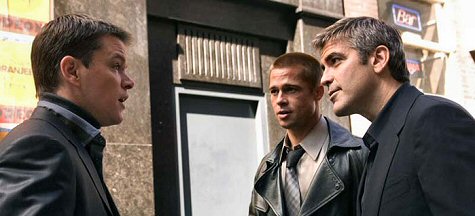
He sure as hell isn’t carrying on the tradition of Richard Lester anymore…not with Ocean’s Bullshit 11 to his credit and the firing of Griffin on his conscience, and the visually swampy, what-the-fucky Full Frontal to answer for, on top of the crib-death failure of Solaris and now the likelihood of another big-budget jape…or is romp the more accurate term?…with Ocean’s Who-Gives-a-Crap? 12.
I don’t mean to sound like a rank sourpuss. I like japes, romps, caper movies …whatever. As long as they’re clever and winning and well-acted. Peter Yates’ The Hot Rock (’71) is a example of a great jape movie. I love it — I’ve seen it maybe eight times. If Ocean’s 12 (which I won’t see until early next week) has the same kind of vibe and agility, cool. Soderbergh will still be the Hollow Man, but at least I won’t feel burned.
I realize it may all turn around when he does his Che Guevara movie with Benicio del Toro. Maybe that will be the Big Turnaround and after it’s made Soderbergh will start admitting in interviews what a fallow period ’01 to ’04 was, etc. Let’s hope so.
Soderbergh’s malaise is clearly tracable to his production company deal with Warner Bros. Maybe he wanted to live on his partner George Clooney’s level and maybe he wanted a better class of girlfriend, so (in all likelihood) he went for the dough. Maybe there’s some kind of vague Samson-and-Delilah thing going on and Soderbergh’s wife, Jules Asner, is somehow sapping his essence or messing with the purity of his genius-geek boy-nerd sensibility.
Maybe he needs to just renounce everything and start wearing sandals and sarapes and go to Guatemela and live in a cave and find his soul again. I don’t know. Thoughts?
Feel His Pain
I’ve only read portions of David Thomson’s The Whole Equation (Knopf, now in stores), but it’s obviously another brilliant work by a man I believe to be our greatest film essayist and critic. Thomson’s books are always sublime. And like all the others, this one is written in a clean and graceful prose style that’s not too academic or snooty, and is always serving up thoughts, insights and asides of a wholly fascinating nature.
The Whole Equation is a detailed, penetrating, here-and-there history of the psychology of American filmmaking over the last 100 years.
The title comes from a line of dialogue taken from F. Scott Fitzgerald’s The Last Tycoon, a novel about the Hollywood career of MGM producer Irving Thalberg. I don’t know the speaker, but a guy is saying Hollywood “can be understood, but only dimly and in flashes. Not half a dozen men have ever been able to keep the whole equation of pictures in their heads.”
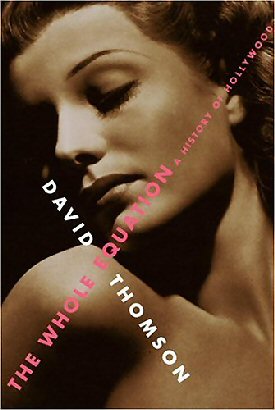
Thomson is one of those guys. His book juggles and eyeballs and sorts through the whole shmear. It focuses in on the core elements, and then puts them all into a pan and turns on the heat and sprinkles on seasoning, and then lays it out on the table.
I love that it’s not written in some sequential history-book way, and it has all kinds of great anecdotal data. I love reading what stars got paid for this or that role. I wonder how Humphrey Bogart spent the $35,000 and change he made for starring in Casablanca. Marlon Brando earned $125,000 for acting in the great On the Waterfront, but $5 million for his stupid 10-minute cameo in Christopher Columbus: The Discovery . I eat this shit up.
My favorite parts are those that explain the personalities and manic compulsions of Hollywood craziest (as in crazy-beautiful) — folks like Robert Towne, Louis B. Mayer, Eric von Stroheim, Nicole Kidman, David O. Selznick, Steven Spielberg, and Joe Gillis.
Especially Joe Gillis — the famously embittered screenwriter played by William Holden in Billy Wilder’s Sunset Boulevard. As this haunting 1950 classic starts up, Gillis, who’s marginally talented but probably isn’t good enough all the way around the track, is in a pickle. He’s broke, can’t get a job and is about to have his car repossessed. He winds up working for a has-been movie queen named Norma Desmond on a rewrite job, and then becomes her gigolo lover, and winds up floating in her swimming pool with two slugs in his back. Or is it three?
Equation offers a very amusing riff about what the terms of Joe’s humiliation would be today. If, that is, he had been born around the time of Sunset Boulevard‘s release. Here’s how most of it reads:
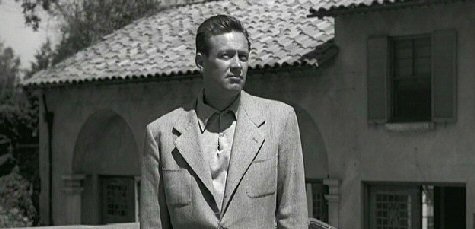
“It is 2000 or so, and Joe is a modest success in Hollywood. He has some good credits, and he gets new assignments. He is, of course, a member of the Writers Guild, and as such — so long as he keeps working — he enjoys the Guild health plan (it covers dental), the pension scheme (Joe is in his fifties), and death benefits. And because of the Guild’s steady pressure to raise the respectability of the writer, and because of Joe’s agent’s endeavors, he can get $350,000 for a script. In return, he owes the Guild $100 a year plus 1.5 percent of his gross earnings.
“Now let’s do a little gentle math on Joe. He has a house in Santa Monica, one he bought seven years ago (at the time of his second marriage). He got it for $850,000 then, and with refinancing his monthly mortgage payment is $5000 (though he now owes $970,000 on the house). Thanks to Jarvis-Gann (Proposition 13 it was called), Joe pays only about $8500 a year in property taxes. But the state has suffered in other ways because of Proposition 13: it has lost the quality public schools it once had.
“This hits Joe quite sharply. He had a first wife and a divorce, and although California is a no-fault state, the judge nailed him. He plays alimony of $5000 a month. He has a nineteen year-old at Dartmouth (that’s $40,000 a year if you count plane tickets) and a fifteen year-old in a private high school ($25,000). Then he has a six year-old boy by the second marriage ($15,000 a year at a Montessori school).
“Joe also likes to keep a small office in Venice; he works better there, and he has learned that a man deserves a private life. The office and his secretary (just three days a week) run him $25,000.
“Are you counting? The annual total so far is $313,850.
“I forgot to mention the therapy; not for Joe (he bears up), but the two older kids go once a week and that is $14,000 a year. Now his second wife is saying it’s unfair that the six-year-old doesn’t go, too.
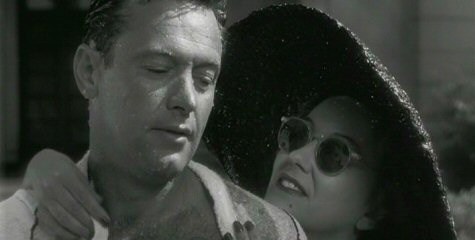
“So far the expenses are $327,000, against income this year of $350,000. Joe is lucky. He has work and a nice house and three kids who are all sound of body if inert in the mind. He has a little left over for a vacation. But the second wife (she is a lot younger than he is) wants to open a dance studio that could be very capital-greedy in its first few years. And Joe really needs a new car. Living in Santa Monica, his drives to the studios are rough and getting rougher. His Volvo is creaking. He has his eye on something just a bit spiffier.
“Look, he’s in trouble, which is why he is considering this second job, a moonlighting polish called Bases Loaded about a girls’ softball team. It doesn’t really need writing, so much as catching the way teenagers talk in the mall. And Joe has traded on having teenagers — he talks to them incessantly; it troubles them, but he has the latest slang. It’ snto going to be anything Joe will be proud of, but he needs the second check. It’s that or some TV stuff.
“Anyone living in Hollywood will have detected an extra irony in the equation of Joe’s economy. If he does better, his fiscal parameters will expand to keep him pinched. His house, on Montana, is rather shabby. To mix usefully with the A-list people, he needs to live in Beverly Hills. That is not going to happen at under $2.5 million. In turn that would push his mortgage payments to $120,000 a year. To say nothing of staff — he’s going to need a housekeeper, a gardener, and catering services from time to time.
Thomson runs another tabulation of Joe’s income and expenses, noting that he makes about $1 million but has to spend $1 million to keep his life rolling, which, as his accountant points out, leaves the accountant unpaid.

“Joe lives in another trap. At his standard of living, he cannot yield to even his own great ideas, supposing he has them. Suppose he thinks of a lovely, simple story; the whole arc of it comes to him as he knots his tie. But it’s a small film, a little gem. How small? Well, it could happen — Joe knows a start-up company that would fund it (at a modest level). Joe could write it and direct it (the thing he’s always dreamed about), for $200,000 — two thirds of that deferred. Here it is — the apple of his eye.
“But he can’t do it. He can’t afford to step down. He needs projects of a certain size. Maybe his wife or a child (I ilke that better) taunts him: “You’re only doing it for the money, Dad!” He protests. He argues. He turns angry. He is a writer, isn’t he?
“But when he sleeps, he has a dream in which God (or is it his agent?) comes to him — they are sitting up on Mulholland, surveying the city on a warm night – and says: “Here’s the deal. You can make the film you want, the film of your best moments – for nothing. Or, we’ll never make another film you touch, but we’ll give you $2 million a year.”
Intrigue
“Find out the movies a man saw between the age of ten and fifteen…which ones he liked, disliked…and you would have a pretty good idea of what sort of mind and temperament he has.” — Gore Vidal, Paris Review interview, 1974, as excerpted in David Thomson’s The Whole Equation.
Overheard
“I liked it, it’s well done but I wasn’t crazy about it. I didn’t believe he’d stay with that neurotic wife. I could be in the minority…I didn’t hate it… but the ending is the ending and that’s what you go out with. It’s no home run ending. There’s no reason to stay with her. She had an affair, which she admits to him. There’s a line that she had an affair, she says yes, I slept with him. I don’t get it. It doesn’t ring true for me. [The director] shot all kinds of different endings, but he just didn’t know what to do at the end, and the ending he chose is flat. And yet overall the whole picture is very well done.”
Prick Up Your Ears
Nancy Porter of Sierra Madre (east of Pasadena), California, was first to identify last Wednesday’s dialogue clips.
Clip #1 is Laurence Olivier using metaphor in an attempt to seduce his servant, played by Tony Curtis, in Stanley Kubrick’s Spartacus; Clip #2 is George C. Scott’s doctor in Arthur Hiller’s The Hospital, describing the emotional shambles of his life, and Clip #3 is Barnard Hughes from the same film, explaining all about “death by irony”; and Clip #4 is an Tilda Swinton and.
Today’s Clip #1 is an exploration of the implications of silence, and Clip #2 is a response to a particular conclusion about this. Clip #3 is from a conversation on a beach in Mexico; and Clip #4 is a “eureka!” scene from the annals of advertising.
I’ll post the winner on Wednesday, 12.8.
Air Hugs
“If memory serves, you’re the writer who gave a close reading to that photo of Leslee Dart with Nicole Kidman that ran in the N.Y. Times. In any case, if you’re interested in further study of Hollywood publicist body language, check out the photo that runs with the Kingsley-Dart story in the current (12/6) New York magazine.

“In this one, Dart has her arm around Harvey Weinstein, and she’s doing the exact same thing to Harvey that Nicole did to her — she’s got her arm around him, but only her thumb is touching him. And not even that, because her thumb is only barely touching his should and is resting on its side The rest of her fingers are awkwardly poised above his shoulder, hovering in mid-air.
“Maybe these days, Harvey is even more of an untouchable than she is. Or maybe both Leslee and Nicole are covertly flashing some sort of gang sign.” — Walter van Tilburg Clark
Makeover
It may be total bullshit, but if there’s any truth to the 007 franchise-destroyers Michael Wilson and Barbara Broccoli giving serious thought to hiring Colin Salmon as the new James Bond, it would be the absolute coolest move of their mediocre lives.
Britain’s Sun newspaper is basing a speculative story that Salmon might be the guy on ]nothing but the fact that Salmon signed an autograph for a young fan by wrting, “To Sebastian, have a wonderful life!! Colin Salmon 007”, on a photograph of himself in Alien Vs Predator.

Salmon played the British intelligence officer Charles Robinson opposite Pierce Brosnan in the last three Bond flicks.
“The casting of Salmon would certainly bring a new twist to Ian Fleming’s creation — after a Scot, an Australian, an Englishman, a Welshman and an Irishman, Salmon would be the first black Bond,” the Sun story wrote.
Filming on the untitled Bond 21 is set for sometime in 2006.
Bitch Slap
“Well, Mr. Wells, you dodged a bullet. As an enlightened female whose ears start shooting steam every time some male tries to tell me how women and their domestic tyranny are the cause of all of man’s collective sufferings, I was prepared to bawl you out as soon as you started in on your `drop that bitch’ rant.
“But you surprised me (okay, I admit it, I shouldn’t have prejudged you), and by the time I realized what you were getting around to I figured that you were just stating a fact that’s true for a lot of guys (though this truth may be their own fault, and have nothing to do with their wives) and not going for the cheap misogynist insult.
“And I could go into a whole tirade about how too many men do end up leaving their wives in the lurch to pursue fantasy women in spite of the fact that said wives have botoxed and belly-crunched themselves half-to-death in the hopes of preventing exactly that occurrence, but that would be going for the cheap misandrist insult, and you don’t deserve that (at least not today.)

“Instead, I’d like to mention that it’s not only men who are leading the lives of quiet desperation that you describe. Women go to the movies for fantasy, too. When you go to a romantic comedy, plenty of the women in the audience are married, and they’ve come there to drool over Colin Firth and Hugh Grant even while trying to avoid the unpleasant mental comparison with their own balding, beer-bellied, football-watching husbands.
“And why do you think Erin Brockovich was such a big hit? The (straight) women in the audience weren’t there to stare at Julia Roberts’s breasts, but because they loved the idea of a sassy southern woman with three children sticking it to an evil utility company while hooking a sexy/dangerous biker guy to stay home with the kids so she can go out and kick corporate ass. This is the stuff female dreams are made of, and if
“Spanglish draws in a huge female audience, I can tell you it won’t be because the women in the theatre really like Tea Leoni’s self-loathing harpie (if that’s what she is), but because they’re turned on by the idea of an honest, patient husband who takes his wedding vows seriously and heroically resists the (understandable) urge to leave his wife for the sweet, young, non-English-speaking-and-therefore-emotionally-low-maintenance household help. Because that kind of guy is, in too many cases, just a fantasy.
“But here’s my last point (and the only one you’re probably even remotely interested in): Buck up! I went into As Good As It Gets with a similar attitude: why would I want to watch Jack Nicholson get paid to act like an ass for two hours? But I was won over, because the movie transcended the lame marketing slogan that read “Brace yourself for Melvin,” and became a story about people who seemed real to me and whose lives I was invested in without necessarily wanting to be best friends with any of them.
“If Brooks does what he’s capable of doing (and do we have any reason to believe he won’t?), then Spanglish will follow suit, and that gag-inducing ‘every family has a hero’ tag line will have nothing to do with the reality of the film, which won’t pander and won’t make anyone into a stock whipping-boy or harridan and won’t leave all the straight males in the audience feeling emasculated and depressed. Here’s hoping.” — Ashley Reed, Atlanta, GA.
“Regarding your item about whether or not the premise of Spanglish will appeal to most men, I have one comment. Bitter much?
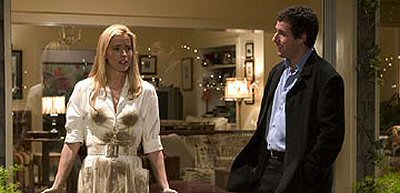
“This is just speculation, of course, because I haven’t seen it either, but maybe Brooks and company aren’t concerned with bringing men another fantasy piece about how wives are evil shrews and pretty new acquaintances are hot. Maybe they’re offering women a portrait of a man who loves his children.
“Or maybe the film isn’t meant to appeal to any particular subgroup of human beings at all. Maybe they’re simply offering a quality script based on real human emotions portrayed by solid performances, a talented director, and (with any luck) Sandler’s follow-up to the potential he showed us in Punch Drunk Love.
“Again, I don’t know if any of this is right, and admittedly it could very well be overly optimistic and a bit naive. But, I haven’t seen it yet and neither have you. Just curious why you’re so quick to damn the concept before you’ve seen how it’s handled.” — Sarah Lenzini, “a non-toxic wife in training,” St. Louis, MO
Rahoi vs. Zelter
“Jon Rahoi sounded a little naive in his article when he suggested that it was just limited economic growth which kept the mainland Chinese from seeing Hollywood films.
“Let’s not forget that the source of that limited growth comes from the Chinese living under a totalitarian communist country, in which wages for actual effort are artificially deflated to subsistence levels, rather than the actual value of their contributions.
“Not to mention the authorities in question have the power to review each and every single film, and either ban them or demand they be edited to conform with their politically-correct policies. So even if the people want the real thing, they have to settle for bootlegs, because the party decides what’s appropriate for them to consume.” — Daniel Zelter

Rahoi responds: Sorry to burst your bubble, but China is Communist in name only these days. Your summary of Chinese life is in fact pure fantasy to me, cribbed from whatever textbook you used in tenth-grade Sociology.
“While the culture you described might have been the case two decades ago, China today is a much different place. The ‘totalitarian communist country’ you mentioned is, in reality, a thriving economic juggernaut, with private ownership of land and businesses. In this, the southern part, I can watch uncensored Hong Kong broadcasts as easily as state news, check U.S. websites, and write about China unchecked from my apartment.
“You’re right that the government still keeps a lid on the media, but it’s blown way out of proportion when mentioned in the states. The truth is, there just isn’t much of a film-distribution infrastructure yet, and absolutely no market for most crappy American movies. Just because Red Corner didn’t open here doesn’t mean it’s Soviet Russia — the movie just sucked.
“Your wages for actual effort are artificially deflated to subsistence levels’ statement is laughable. Wages here, while low, are determined by market forces alone. The Chinese government is far more laissez-faire than our own, and the next ten years will bear that out. Don’t come crying to me when the Chinese guy who takes your job buys your house and rents it out to you at a profit.”
Neverland
“Jeff, you don’t get Neverland. I think everyone who reads your column understands that. But you spend most of your late column praising the National Board of Review’s choice of Michael Mann as director, but their choice is, of course, horribly compromised. If only they hadn’t chosen Neverland as Best Picture!
“Jeff, you just don’t get it. You don’t have the receptors, you’re too narcissistic, you’re too antsy, you’re worried about what’s young, hip, and really edgy. Okay, we get it . You don’t think Neverland is any good….for you. And if not you, then who?
“But just acknowledge that maybe there are certain cinematic mysteries that are beyond your grasp and let it go. And quit calling older people blue hairs, you fucker. Perhaps if you quit yammering so damn much, and paid a little bit of attention to what other loved and why, you could learn something new. Or not.” — Kathleen Denning .
Flyboys
Universal Home Video isn’t making a huge effort to inform you about this…they care but not all that deeply, I mean…but there’s a very decent-looking looking DVD of Howard Hughes’ Hells Angels (or so I’m told) hitting video stores on 12.7.
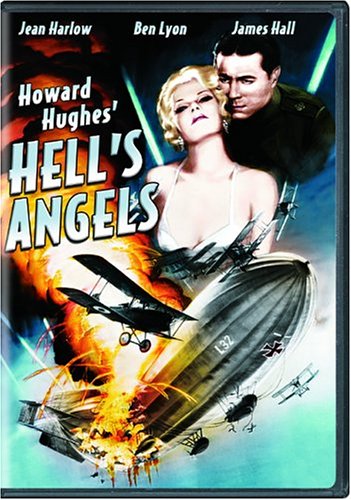
I would have gotten into it a bit more, but the publicists at UHV don’t consider me a prime word-spreader about DVD’s, and I was frankly too crazed to get around to asking them for a copy, which is always an effort.
The Los Angeles County Museum of Art is having a screening of Hells Angels on Friday, 12.10, at 7:30. This, one could argue, would be the preferable way to see a classic film — biggish screen, appreciative crowd, etc. I just hope the sound is loud enough.












